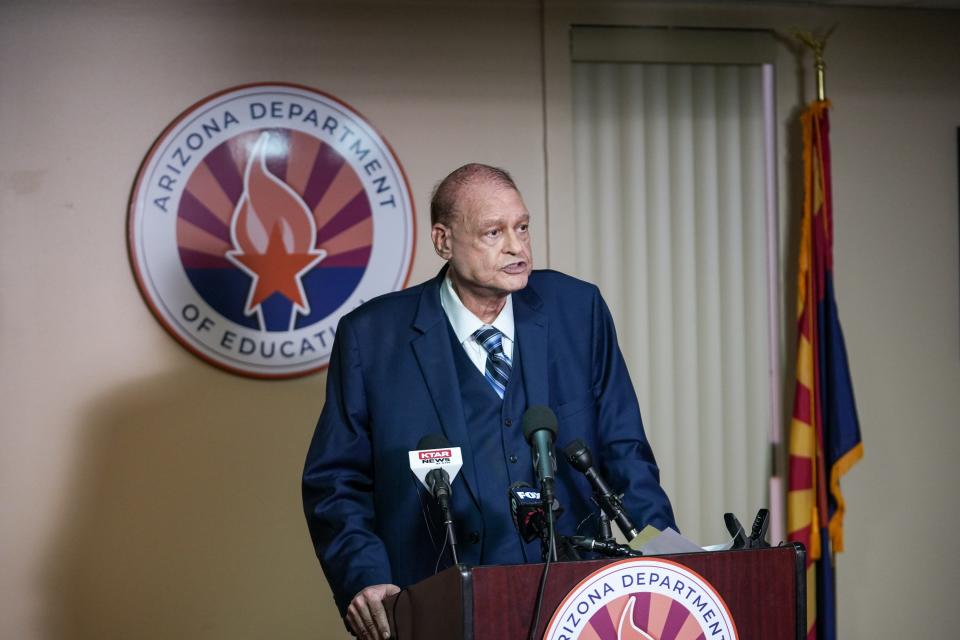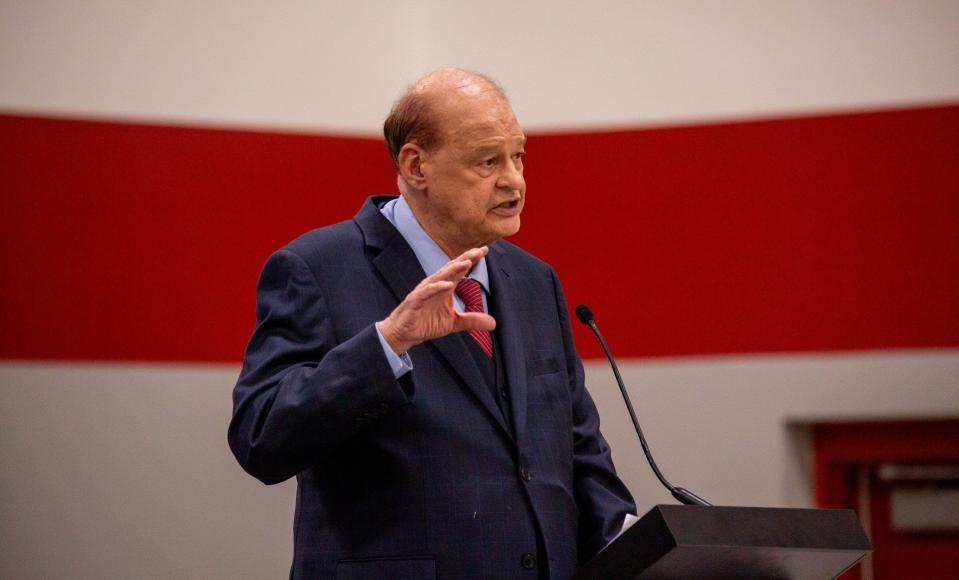Arizona schools ignore, criticize 'potentially misleading' survey sent by Department of Education
Hundreds of Arizona schools declined to answer two state Department of Education surveys that some education leaders said were politically motivated or unclear.
In January, Superintendent of Public Instruction Tom Horne asked school leaders to answer a five-part "academic focus attestation" and, in a separate request, to affirm compliance with a state law that requires Holocaust and genocide education.
More than one-third of public schools did not answer the five-part attestation, according to the education department, and more than half of public school districts and charter schools didn't reply about Holocaust instruction.
"It's because they are doing critical race theory or inappropriate sexual stuff, and they don't want to lie, and they don't want to give honest answers either," Horne said in an interview with The Arizona Republic.

School leaders criticize 'potentially misleading' survey
The attestation asks for yes or no answers to five statements, reproduced here as written by the Arizona Department of Education:
The school protects instructional time from excessive distractions labeled as Social Emotional Learning.
The school/district appropriately respects all students as individuals, avoiding concepts like Critical Race Theory, that promote racial division.
The school/district fully supports teacher discipline recommendations.
Sexual content taught in school is developmentally appropriate.
Curriculum at school does not expose students to explicit or graphic content that is developmentally inappropriate.
Attestation responses are displayed in the department's online school report cards, which detail academic performance, enrollment demographics and other information parents might seek about a school. If a school has not responded to the attestation, that section of its report card will be flagged with red text.
"I'm not forcing anything. I'm just wanting parents to know so they can choose the school with knowledge," Horne previously told The Republic. "It's up to parents what they consider is important."
Because the department cannot sanction schools that don't comply, its only option to impose a consequence is public shaming, said Paul Tighe, executive director of Arizona School Administrators, a nonprofit that supports school leaders.
Some in Tighe's network of administrators characterized the questions as subjective and politically charged, he said.
"What's excessive? By whose definition? And protecting student instructional time, that's kind of loaded. It implies that there are things in SEL that are not instructional," Tighe said. "They're just poorly worded."
Tighe said that withholding answers might indicate that school leaders do not believe the questions are credible.
After some pushback, the department added a comment box for schools to elaborate on their yes or no answers. Even then, some decided that wasn't enough.

All 26 schools in Kyrene Elementary School District chose not to respond due to potential ambiguity, according to a statement provided by spokesperson Erin Helm. Kyrene "prides itself on transparency" and fears "oversimplified answers to potentially misleading questions" would generate confusion, the statement said.
Tolleson Union High School District Superintendent Jeremy Calles said the district's leaders "carefully considered responding" for its eight schools but ultimately declined.
"The questions were designed in a manner where a simple Yes or No could be misleading depending on the context used to present the result to a reader," Calles wrote in his statement. "Our District complies with all State and Federal Laws but we also work closely with our community and take our direction from our community when determining how to best serve our students and families."
Horne said those critiques were unfair, and his questions were "the opposite of political."
Horne says declining to respond is a transparency issue
Horne described the lack of participation by more than 900 schools out of roughly 2,500 as "scandalous" and an affront to transparency.
"Parents have the right to be fully informed about what their neighborhood schools value and how instructional time is used," Horne said in a press release. "Every instructional minute is precious, and every minute should be devoted to academics, not unnecessary distractions, lessons that divide people by race, or exposing students to subject matter that is not developmentally appropriate."
Tighe said the matter is "not at all" a transparency issue. Administrators fear people will look for exceptions to their subjective answers and characterize their schools as being untruthful, Tighe said.
"Suppose you say, 'Yes, we protect kids from sexual content,' and then somebody pulls out a National Geographic magazine on your library shelf, and there's a picture in there that might have an African tribe where women walk around without shirts, and says, 'A-ha! That's sexual content. You lied,'" Tighe said.
The question about supporting teacher discipline recommendations might also be misleading, he said, because schools are bound by student discipline policies. If teacher recommendations conflict with policy, there's little a school can do.
Horne wanted to grade schools on the use of critical race theory
Last year, Horne's office proposed a change to the state's A-F school grading formula that would have penalized schools for teaching critical race theory or using social and emotional learning tactics. Letter grades are a standardized indicator of school performance determined by the State Board of Education.
That effort failed before gaining much traction. The department never brought its proposal before the full board.
A state board committee voted against the department's proposal, according to state board Executive Director Sean Ross. Committee members expressed concern that the proposal did not align with the objective, quantifiable and student achievement-based measures that characterized the existing formula, Ross said.
School report cards are an alternative way to bring information about what schools are teaching before parents, Horne said.
More detailed Holocaust education law is in the works
Just 322 out of roughly 750 school districts and charter schools affirmed they are teaching about the Holocaust and other genocides, the department announced Monday. These lessons are required under state law, though the law does not specify how many hours teachers must spend on the topic or dictate specific content requirements.
Tighe said "quite a few leaders" were unaware of the request and might never have received it due to distribution list errors or spam filtering. Horne's requests were sent by email.
Others, he said, might have "simply ignored the request." Districts already give annual attestations that their teachers teach to state curriculum standards.
"So it's kind of redundant to say, 'Well, we also, yes, affirm that we teach to this particular standard,'" Tighe said. "It seems a little politically motivated."
Horne nevertheless pointed to his survey results as justification for efforts to bolster genocide studies requirements.
House Bill 2779, a bipartisan effort that would require students to be taught about the Holocaust and other genocides for the equivalent of three school days at least twice between grades seven and 12, passed the House last month.
"I am gratified that 322 districts and charters are following the law, with many of them taking anywhere from two to four weeks to do the instruction," Horne said. "That is commendable, but we need this bill to be sure all districts and charters are in compliance with the intent of the law."
Reach the reporter at nicholas.sullivan@gannett.com.
This article originally appeared on Arizona Republic: Arizona schools don't answer Horne's 'potentially misleading' survey

